Each month, Daniel Haeusser reviews short works of SFT that appear both online and in print. He is an Assistant Professor in the Biology Department at Canisius College, where he teaches microbiology and leads student research projects with bacteria and bacteriophage. He’s also an associate blogger with the American Society for Microbiology’s popular Small Things Considered. Daniel reads broadly in English and French, and his book reviews can be found at Reading1000Lives or Skiffy & Fanty. You can also connect with him on Goodreads or Twitter.
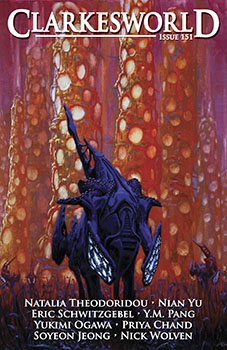 “The Flowering” by Soyeon Jeong, translated from the Korean by Jihyun Park and Gord Sellar
“The Flowering” by Soyeon Jeong, translated from the Korean by Jihyun Park and Gord Sellar
Clarkesworld Magazine Issue 151, April 2019
Have you ever been in a public place, with no choice but to listen into someone’s one-sided phone conversation? The start of this short story made me feel similarly: mildly annoyed and trying to figure out the silent other half. It’s constructed as an interview (or interrogation) of a woman whose sister is serving a prison sentence for massive disruption of state-controlled Web access. I slowly became fine with this construction as the story unfurled like the flowering symbolism that pervades it. The sister has used a technology that combines the natural and artificial to plant seeds throughout the country that open the Internet to everyone, bypassing government permissions and monitoring. The focus of the story is not on the act itself, but the relationship between the sisters and conflicts between family ties and drives to change society. On one hand I really liked how well the story gave out details and kept the two sisters at center. However, the actual “flowering” technology is clearly more metaphoric than realistic, and reconciliation of those extremes would’ve been even better.
“In Search of Your Memories,” by Nian Yu, translated from the Chinese by Andy Dudak
Clarkesworld Magazine Issue 151, April 2019
Futures where consciousness may be uploaded into some technology that continues existence after bodily death is nothing new to speculative fiction. Within that idea many authors have written plots of something going wrong with transfer. The narrator of this story works to find and restore memories to clients who had imperfect uploads, and they now have a client with mysteriously significant memory gaps that don’t seem attributable to random transfer errors. What makes the speculative theme of this story unique among others is what accounts for this gap. The focus on the narrator and the ethical decisions they make while investigating the memory gaps strengthens this story, as does the almost haunting language used to describe details while shifting through their client’s remembered life. The language conveys a deep sense of respect for the person now bodily gone, who now lives on in a new existence, not fully the same any longer. This connection between existing funeral practices and a speculative technology is a detail I’ve not noted before, and it’s special.
 “The Last Journey” by Florin Purluca, translated from the Romanian by the author
“The Last Journey” by Florin Purluca, translated from the Romanian by the author
SFinTranslation.com April 4, 2019
Flash fiction works well for tongue-in-cheek humor and quick surprises. This piece does that by starting with language that seems to fall into ‘hard’ science fiction full of technical detail above all else, but then does a complete turn into religious satire. From a theological standpoint I found it juvenile, an uninteresting take on the ‘why does God allow bad things to happen’ question. In contrast, Rachel loved it! And it’s short enough for you to easily decide yourself.
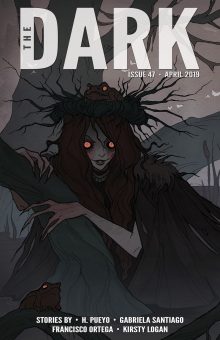 “Seventy-Seven” by Francisco Ortega, translated from the Spanish by David Bowles
“Seventy-Seven” by Francisco Ortega, translated from the Spanish by David Bowles
The Dark Magazine Issue 47, April 2019
Assistant DA Antonieta Baculic seeks advice from Sergeant Amador Martínez for help investigating a series of strange, grisly murders identical to ones he investigated fifteen years prior. Baculic realizes that they have some broad connection to Chilean politics and former war crimes and that Martínez must have discovered something that led to his removal from investigations into a desk job. Reluctant to give her information, Martínez nonetheless feels compelled to prevent her from suffering his fate. Book-ended with richly dark scenes set in that time fifteen years prior, the bulk of the story consists of dialogue that for me does far too much ‘telling’ to explain the logic of the supernatural nature behind these murders. Martínez’s apparent misogyny (or at the least his objectification of women) appears as a theme, but doesn’t really fit into the rest of things as far as I could tell. Ultimately the story is a way of putting a supernatural and conspiracy-theory spin on horrors of Chilean history. But, I find this inherently problematic as the horrors are already worse enough without adding a supernatural ‘explanation’ that then also makes them seem unconquerable.
![]() “Looking for Carla” by Carlos A. Duarte Cano, translated from Spanish by Toshiya Kamei
“Looking for Carla” by Carlos A. Duarte Cano, translated from Spanish by Toshiya Kamei
Teleport Magazine, April 2019
A telepathic narrator relates his or her (as far as I can tell the story in English does not definitively indicate) efforts to find a beloved Carla, who does not know the narrator is telepathic. The narrator has been unable to tell Carla the truth of his/her secretive work, and she has given up on their relationship in frustration and feelings of neglect. The story is a speculative take on the balances that are made in life between professional responsibilities and the love and devotion one also wants to give to a partner. The first translation of work from this author into English, I mostly enjoyed the theme and the sense of desperation you see in the narrator. However, the author explicitly points out some speculative details that the reader can easily infer without being spoon-fed. I can’t comprehend Spanish, but the English text flows very effectively and word choices seem perfect to capture the atmosphere of the story.
“Following Alice” by Florin Purluca, translated from the Romanian by the author
Teleport Magazine, April 2019
A second story this month by Purluca, and again it starts as seemingly one thing, to suddenly turn on a pin into something unexpectedly different. This longer one begins on a calm ferry ride into Port City as a detective observes the setting and surrounding passengers of no particular note. Disembarking, the narrator goes to an inn to find a woman in a photo, and the reader quickly learns that the population of this city are not just human men and women, but fantastic creatures and hybrids. The plot is a rather standard and simple one of a hard-boiled detective who’s in search of some person-of-interest. The fantastic characters make it seem a little exotic and the action gets rather grisly. I enjoyed it more than the flash piece, but it still feels like empty calories.
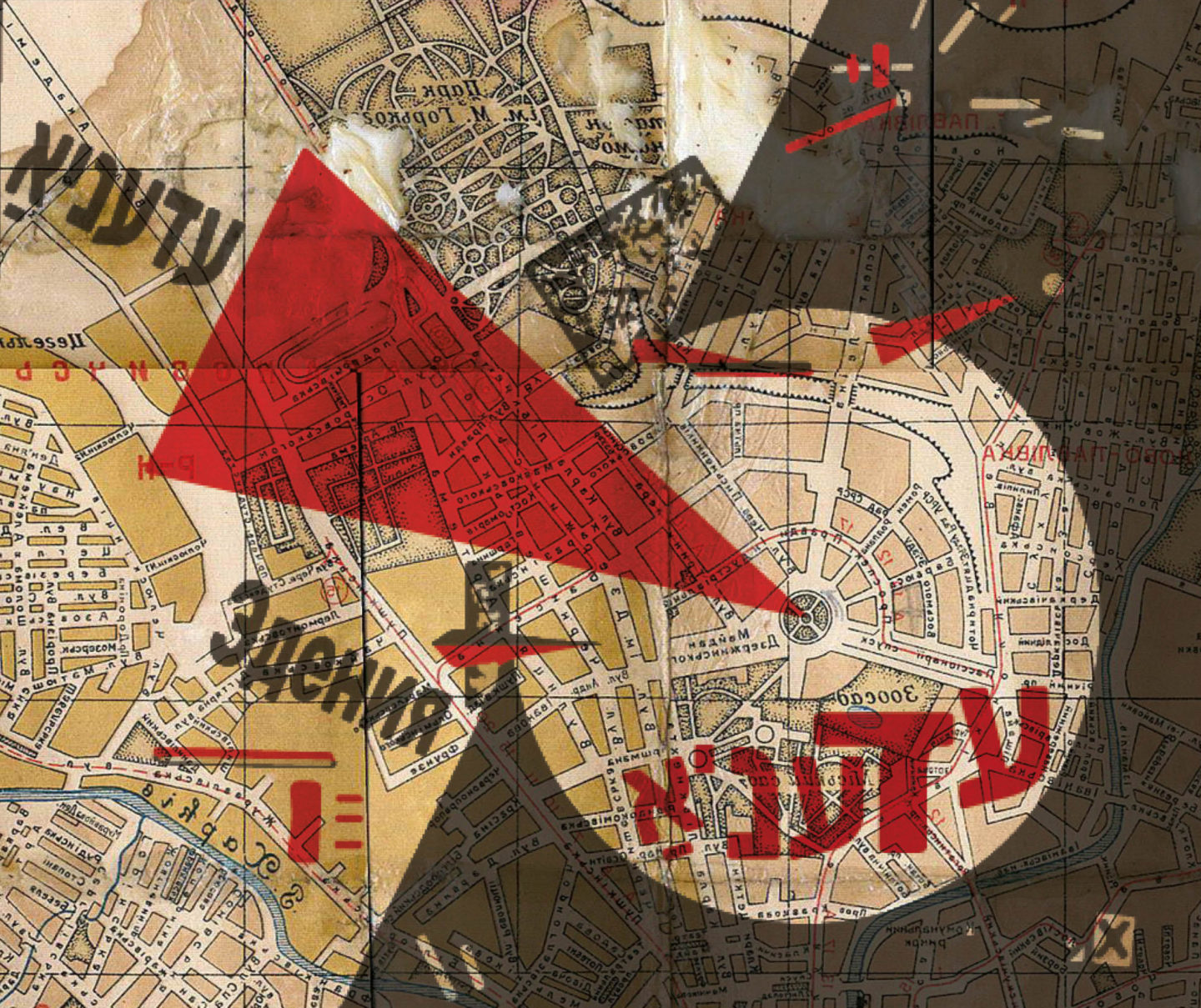 “In the Future City of Edenia” by Kalman Zingman, translated from the Yiddish by Jordan Finkin
“In the Future City of Edenia” by Kalman Zingman, translated from the Yiddish by Jordan Finkin
In geveb, April 2019
The In geveb Journal of Yiddish Studies introduces this 1918 Utopian science fiction with the following:
“…it envisions an ideal of the Jewish Folkists of the interwar period, namely Jewish cultural autonomy on European soil. The protagonist Zalmen Kindishman finds himself in the Ukrainian city of his birth after a career abroad, including several years in Palestine. What he finds is a futuristic land in which scientific endeavor, scholarly inquiry, and political harmony between ethnic groups have ushered in an age of creativity and tranquility which Kindishman finds so wondrous and wonderful that he is ultimately ill-equipped to deal with his emotional exhilaration…”
They publish the novella online in three parts, and also in downloadable pdf format. The story contains lots of speculative technology that in 1918 might seem wonderous, but now seems quaint, and the writing is nothing special. Notable for its themes and historical contexts this reminds me of something you might see featured in the Curiosities column in the back of The Magazine of Fantasy and Science Fiction: forgotten works that might not be timeless literary achievements, but still have something to contribute to fans of the speculative genre and global perspectives of SF and its translation.
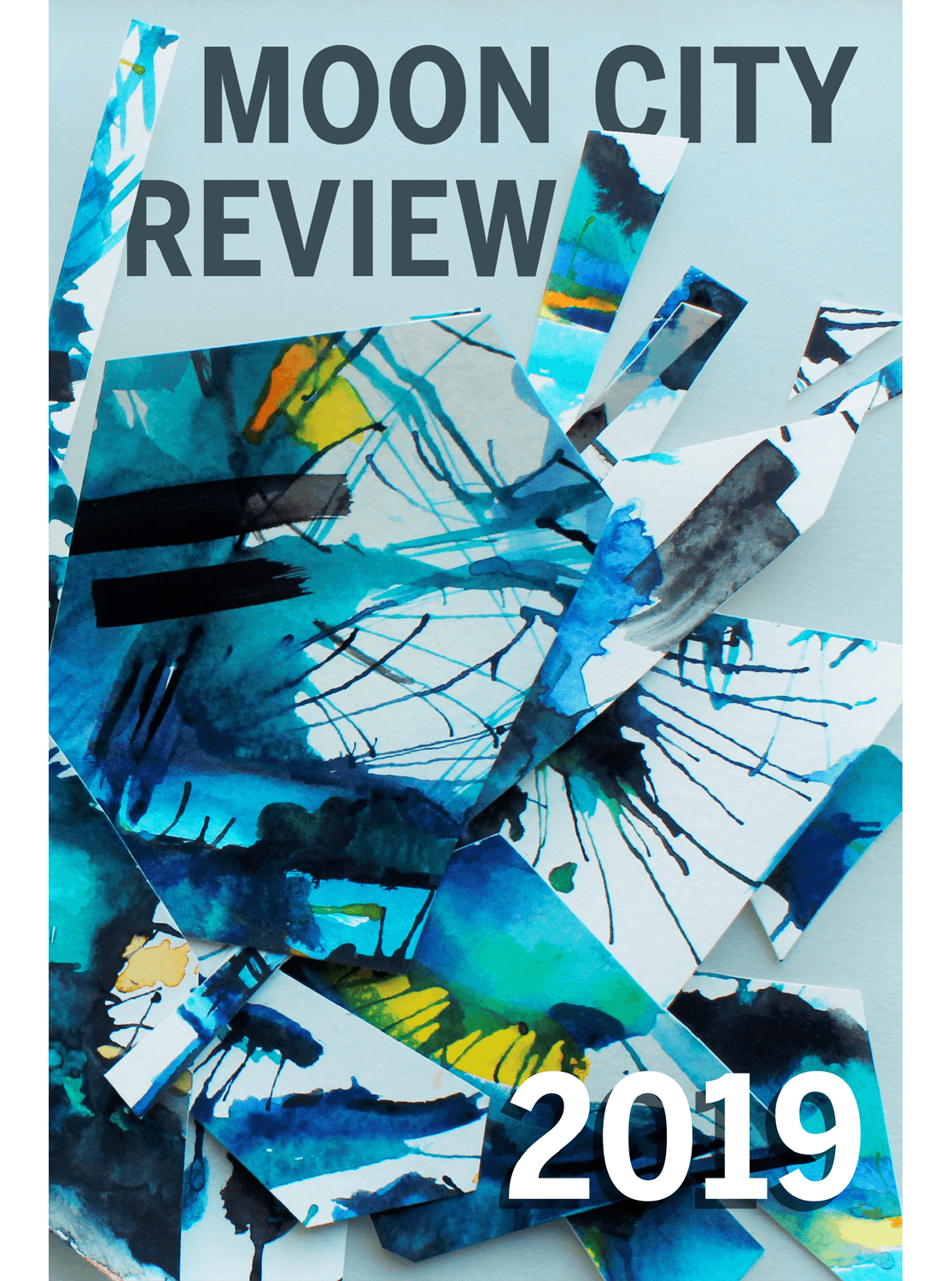 “Paulina” by Laura Ponce, translated from the Spanish by Toshiya Kamei
“Paulina” by Laura Ponce, translated from the Spanish by Toshiya Kamei
Moon City Review 2019
The translator of this and several other stories that came out this month was kind enough to supply copies of these texts for review. The titular character of this dystopic speculative fiction resides in the Autonomous City of Buenos Aires, a setting where employment is not easily attained and other rights, particularly of women, are restricted. The story is a timely one that tackles current issues of immigration and citizenship, and it’s one well worth checking out.
 “Two Leaf Novels” by Yoshiro Takayasu, translated from the Japanese by Toshiya Kamei
“Two Leaf Novels” by Yoshiro Takayasu, translated from the Japanese by Toshiya Kamei
Delos: A Journal of Translation and World Literature Volume 34, #1, Spring 2019
A pair of short fairy tales with modern themes, consisting of “Ryota the Kappa” (about the eponymous mythological monster – and a tanuki) and “Scent of Spring” (about a fairy met in the woods). The stories are followed by biographical information on the author, but most interestingly on the form of writing that Yoshiro Takayasu employs by bridging past tradition with the modern. His ‘leaf novels’ are effectively flash fiction: a story short enough to be written on a leaf. The etymology of this term in Japanese is equally fascinating:
“[The author] points out that “kotoba,” “word” in Japanese, is a compound word made up of koto, which means “talk,” and “ba,” which means “leaf” as well as “fragment.” His “leaf novel” consists of approximately 1,600 characters (roughly 800 words when translated into English), and, in the author’s words, “invites the reader to the world of deep psychological insight, desires, departed souls, and irony.”
These are cool and worth checking out, particularly if you are an aficionado of fairy tales through different cultures.
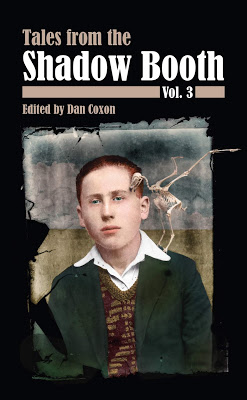 “I Have a Secret” by Raquel Castro, translated from the Spanish by Lawrence Schimel
“I Have a Secret” by Raquel Castro, translated from the Spanish by Lawrence Schimel
Tales from the Shadow Booth #3
The translator and Tales from the Shadow Booth publisher Dan Coxon kindly supplied me with a copy of issue 3 to review this short story translation. Looking at its contents (with a story by Verity Holloway and Robert Shearman jumping out at me) I’m happy to have found this new collection. I do love horror, particularly when it has that perfect voice that both captivates and terrifies. This is written from the point of view of a small boy, Emilio, with all the wonderful language tics and observations one might expect from such a mind. He observes details of a world that is fairly new and scary to him, but that an adult may ignore. His mother has returned home from the hospital, but she seems not quite right. The adults seem unfazed, it’s just the medication. But Emilio is less sure, and nowhere can he find trust or a patient ear. Instead he finds the skill of hiding his thoughts, and the power of lies. Beautifully sweet and sinister.
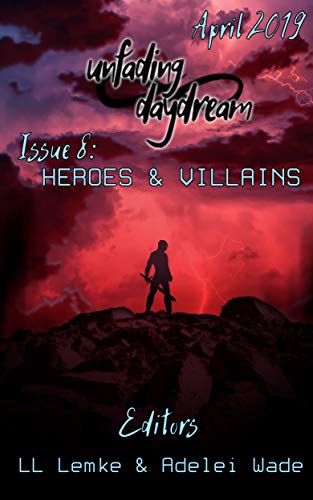 “There Are No Serpents in Heaven” by Swylmar dos Santos Ferreira, translated from the Portuguese by Toshiya Kamei
“There Are No Serpents in Heaven” by Swylmar dos Santos Ferreira, translated from the Portuguese by Toshiya Kamei
unfading daydream Issue 8: Heroes & Villains, April 2019
A devastating plague has left a post-apocalyptic world without humanity, where the narrator has abided in routine for a long time, perhaps too long. The language at the start of this story is exceptional, filled with words like ‘inevitable’, ‘again’, ‘usual’, ‘inexorable’ and sentence/paragraph structure that drive home how the narrator must feel in this emptiness. With lots of references to classical myths/religion the narrator recalls the details of the plague and what has brought him to this lonely condition. For my taste it gives too much explanatory detail rather than leaving the reader questions and keeping the hazy atmosphere of the story’s start. But still, a solid speculative read.
